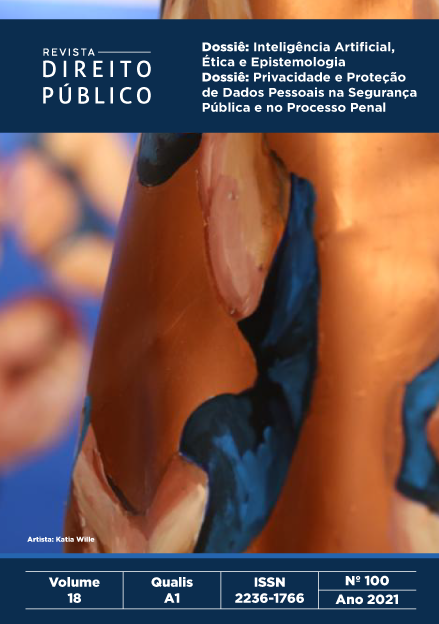Privacy, Data Protection and Law Enforcement. Opacity of the Individual and Transparency of Power
DOI:
https://doi.org/10.11117/rdp.v18i100.6200Resumo
SUMMARY: Introduction; 1 Principles of the democratic constitutional state; 1.1 The Recognition of Human Rights in their Double Function; 1.2 The Rule of Law; 1.3 Democracy; 2 The democratic constitutional state and the invention of two complementary legal tools of power control; 2.1 Limiting power through opacity tools; 2.2 Channelling power through transparency tools; 3 Privacy as a tool for opacity (creating zones of non-interference); 3.1 The negative role of privacy; 3.2 The positive role of privacy; 3.3 The non-absolute nature of privacy; 4 Data protection as a tool for transparency; 4.1 Introduction; 4.2 The rationale behind data protection; 4.3 Data protection as an opacity tool?; 4.4 The charter of fundamental rights of the european union; 5 The shift from opacity towards transparency in european human rights law; 5.1 European human rights law and the legality requirement; 5.2 The success of the legality requirement; 5.3 A critical comment about the strasbourg focus on the legality requirement; 5.4 The danger of proceduralisation; 5.5 A requirement fundamental to opacity: necessary in a democratic state; 6. Combining privacy and data protection 6.1 Combining the tools; 6.2 Determining the switch; 6.3 An example: camera surveillance; 6.4 A second example: passenger profiling; 6.5 Workable criteria?; Conclusion.
Downloads
Downloads
Publicado
Como Citar
Edição
Seção
Licença
Copyright (c) 2022 Direito Público

Este trabalho está licenciado sob uma licença Creative Commons Attribution-NonCommercial 4.0 International License.
O(s)/A(s) autores(as) dos manuscritos submetidos concorda(m) com as regras a seguir:
1) Todos os autores e autoras participaram do trabalho, são responsáveis pelas ideias e conceitos nele emitidos e atestam sua conformidade com os princípios éticos exigidos.
2) Todos os autores e autoras concordam com a forma final do trabalho e em ceder os direitos para publicação nos canais de publicação da Escola de Direito do IDP.
3) Todos os autores e autoras informam que o manuscrito é de sua autoria e assumem a responsabilidade pelo trabalho, declarando que a obra a ser publicada não infringe quaisquer direitos de propriedade intelectual de terceiros.
3.1) Em caso de submissão simultânea, além da reprovação imediata do artigo e comunicação ao(s) respectivo(s) periódico(s), a Revista Direito Público se reserva o direito de não receber novas submissões de todos os autores implicados pelo prazo de 2 (dois) anos, contado a partir da data de ciência do fato.
4) Todos os autores e autoras autoriza(m) a edição de seu trabalho e cede(m) à Escola de Direito do IDP os direitos de autor para reproduzir, editar e publicar ou veicular o citado trabalho em qualquer forma midiática, resguardada a autoria, em particular sob forma digital, em arquivo eletrônico online na Internet, bem como armazená-los em seu repositório de acordo com o desenvolvimento do processo editorial. Esta concessão não terá caráter oneroso para a Escola de Direito do IDP, não havendo remuneração sob qualquer modalidade pela utilização do referido material, tendo este o caráter de colaboração científica.












